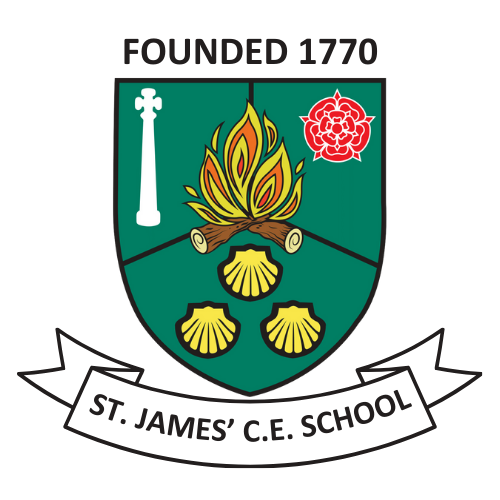Maths
Link Governor: Mr J Noad
Intent:
Mathematics at Leyland St James' CE Primary School is underpinned by the three statutory aims of the National Curriculum: fluency, reasoning and problem solving.
Our intent is for all children to become fluent mathematicians, who are able to confidently recall and apply mathematical knowledge and demonstrate conceptual understanding. We promote and prioritise the use of mathematical language, which in turn, supports children's mathematical reasoning in different contexts. Our aim is to prepare children for the real world and daily life - therefore becoming competent problem solvers by applying their mathematical knowledge with confidence.
Implementation:
In Mathematics, we implement an inclusive curriculum that meets the statutory requirements of the National Curriculum. We use 'Maths - No Problem!' which is a developed scheme centred around mastery learning. The use physical resources, problem solving tasks in a collaborative approach supports children's mathematical reasoning. All pupils work through the programme of study at the same pace with ample time on each topic before moving on. Ideas are revisited at higher levels as the curriculum spirals through the years.
Leyland St James' CE Primary School have developed a 'journaling' to the beginning of each Maths lesson. Journal is a tool for pupils to communicate, articulate and explicate their mathematical thinking during the the exploration stage of learning. From Year 1 through to Year 6, lessons begin with a journaling word problem - prompting discussion, collaborative reasoning and the freedom for children to choose concrete, pictorial and abstract methods to find solutions and methods. Journaling allows children time to explore their own pathway when solving mathematical problems, whilst being steered and guided by the teaching staff. Teachers and support staff facilitate, discuss and develop the learning of specific groups and individuals.
Lessons and activities are designed to be taught using problem-solving approaches to encourage pupils’ higher level thinking. Maths Mastery opportunities are offered to pupils in a range of ways:
1. Maths No Problem: The workbook builds in questions and challenges for mastery and greater depth learning.
2. Teacher Questioning: Using planned and spontaneous assessment for learning questioning, prompting discussion and discovery.
3. Mini Plenaries: Scaffolded mastery discussion points for small or whole class group learning.
4. NCETM Mastery and Greater Depth Teaching opportunities https://www.ncetm.org.uk/classroom-resources/assessment-materials-primary/
5. White Rose https://whiterosemaths.com/resources/primary-resources/primary-sols/
Maths — No Problem! Spiral Approach and Variation:
The spiral approach allows pupils to learn mathematical concepts well and deeply. Click the link to see a planned example of how this works.
See how the Spiral Approach is delivered by topic and year group here.
Impact:
Our well-planned Maths curriculum ensures that children are fluent and confident mathematicians, who are in preparation for the real world. Our children are enthusiastic and competent mathematical problem solvers, within maths lessons and across the curriculum. Our child are highly motivated and engaged Mathematicians who are prepared to be challenged to further their learning.
North West Maths Hubs:
During the academic year 2021/22, we began an exciting journey working alongside our local Maths hub. The hub is funded by the DFE and part of NCETM (National Centre for Excellence in the Teaching of Mathematics) . The aims of the NCETM are to "raise levels of achievement in maths, and to increase appreciation of the power and wonder of maths, across the school..." The Maths Hub Programme allows us to work collaboratively with other schools in the Teaching For Mastery Programme.
Links:

